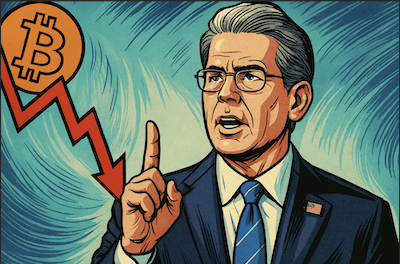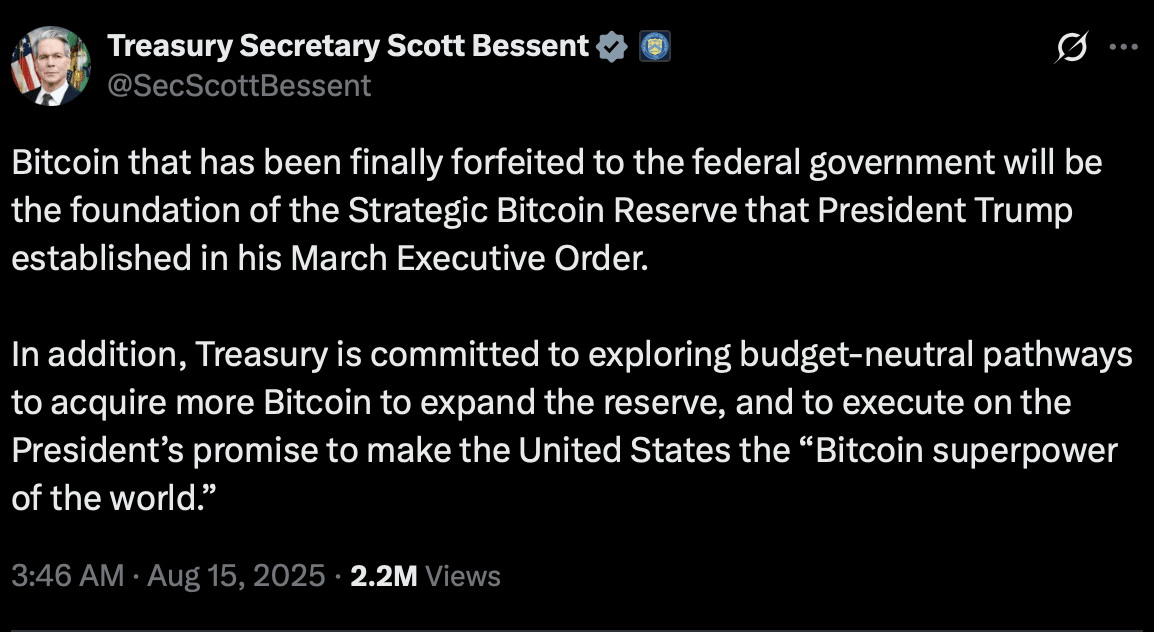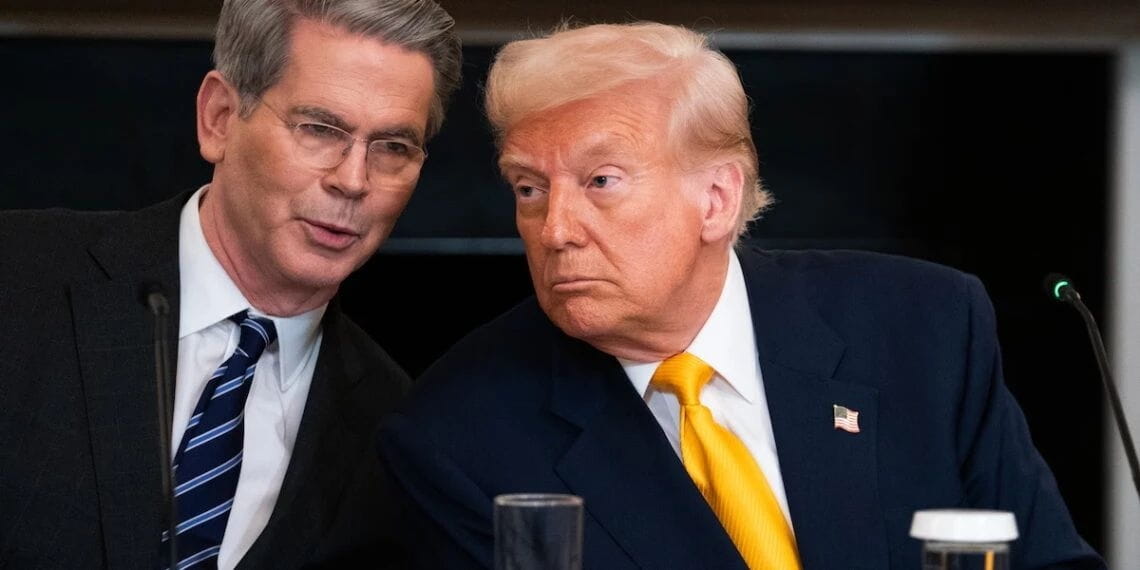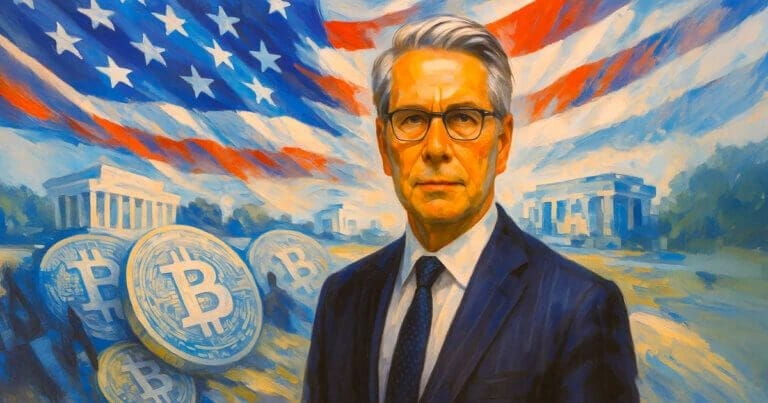In one day, two completely different statements and a policy storm triggered by the highest financial officials in the U.S. caused the global cryptocurrency market to experience a violent roller coaster. U.S. Treasury Secretary Scott Bessent provided contradictory statements on the core issue of 'whether the U.S. will actively purchase Bitcoin to expand its strategic reserves' within just a few hours. This not only led to a rapid evaporation of over $55 billion in Bitcoin's market value but also sparked widespread confusion and strong dissatisfaction in the market.
This chaotic policy communication has starkly pushed a core problem that has been lurking for months to the forefront: the grand promise of the U.S. government to establish a 'Bitcoin superpower' and the legislative reality of its 'budget neutrality' exist in a chasm that is difficult to bridge. The patience of the cryptocurrency market is gradually being worn down by repeated official statements of 'still exploring.'
A panic triggered by a single sentence

The trigger for this incident was Bessent's appearance on a television interview on August 14, where he was asked about the future plans for the 'U.S. Bitcoin Strategic Reserve.' Bessent clearly stated, 'We will not purchase these assets, but will continue to accumulate using (law enforcement) seized assets, and we will stop selling.'
This statement was like a bucket of cold water poured over a market filled with expectations. Investors interpreted it as a clear signal: the U.S. Treasury has abandoned the option of actively purchasing Bitcoin in the market, and future reserve growth will entirely depend on the seizures by law enforcement agencies.
The market's response was immediate and severe. After the news broke, the price of Bitcoin plummeted, dropping from around $121,000 to below $118,000. According to statistics, this sell-off within just one hour caused the total market value of Bitcoin to evaporate by approximately $55 billion.

About seven hours after triggering severe market fluctuations and facing fierce criticism on social media, Bessent clearly realized the seriousness of the problem. He quickly posted to 'clarify' his position: 'Seized Bitcoin will form the basis of the strategic Bitcoin reserve established by President Trump in the March executive order. Additionally, the Treasury is committed to exploring budget-neutral avenues to acquire more Bitcoin and expand reserves.'
This post attempts to pull the policy back to the previous official stance of the White House, which is 'not ruling out purchases, but on the condition of budget neutrality.' However, this inconsistency not only failed to fully reassure the market but also intensified doubts about the confusion in its policy signals.
Although Bessent's clarification temporarily relieved some investors, for many senior industry professionals, it felt more like a 'talk without action' perfunctory response, and long-standing dissatisfaction erupted completely.
Eli Nagar, CEO of Bitcoin mining company Braiins, bluntly criticized, 'Are you seriously still exploring budget-neutral paths? Exploring without execution will ultimately make people feel like you're avoiding action. Act quickly!' Noted Bitcoin consultant Max Keiser also ridiculed Bessent's so-called 'exploration,' deeming it completely untrustworthy. In fact, since President Trump signed the relevant executive order in March, the Treasury's so-called 'exploration' has lasted a full five months without any substantial progress.
Policy deadlock

Bessent's contradictory statements within a day are rooted not in simple verbal errors but reflect the fundamental dilemma faced by the U.S. in implementing its Bitcoin reserve policy—the strict limitations of 'budget neutrality.'
The so-called 'budget neutrality' means that any purchase by the government must not increase the federal budget deficit nor increase the burden on taxpayers. This effectively closes off the simplest route of 'directly printing money to buy coins,' and the Treasury must find a creative way to raise funds.
Although some ideas have been proposed by the outside world and policy circles, such as:
Re-evaluating the Treasury's gold certificates: The official value of the United States' gold reserves still relies on the outdated pricing of $42.22 per ounce from 1973, resulting in a significant gap of hundreds of billions of dollars compared to the current market price. If re-evaluated at market value, it could unleash tremendous purchasing power.
Using tariff revenue: Directly using part of the tariff revenue to purchase Bitcoin.
However, any of these proposed ideas will likely require legislative approval from the U.S. Congress to turn theory into reality. Senator Cynthia Lummis, who has a friendly attitude toward cryptocurrency, has long proposed the BITCOIN Act to empower the government with direct purchasing authorization, yet the bill has yet to make progress on Congress's agenda.
Crisis of trust

Will the U.S. actually buy Bitcoin? The answer to this question has become even more unclear after this day of turmoil. The storm surrounding Bessent revealed not just his personal communication errors, but also the significant gap between the U.S. government's digital asset strategy in top-level design and its implementation.
Compared to the federal level's indecision, a few state governments in the U.S. have already begun small-scale testing. This policy experiment of 'local encircling the central' may reverse-push the federal government to accelerate its pace in the future. But before that, every ambiguous high-level official statement may lead the market to price in 'policy uncertainty' once again.
In the short term, whether the relevant authorization bill can make breakthroughs in Congress will be key to determining whether the 'Bitcoin Strategic Reserve' can transform from a slogan into a real system. In the long run, if the U.S. wants to truly become the 'global Bitcoin superpower' it claims to be, it needs more than just holding enough Bitcoin; it also needs to establish a clear, stable, and predictable policy framework. Otherwise, the trust and patience of the market will eventually be exhausted in repeated 'still exploring' verbal tests.
